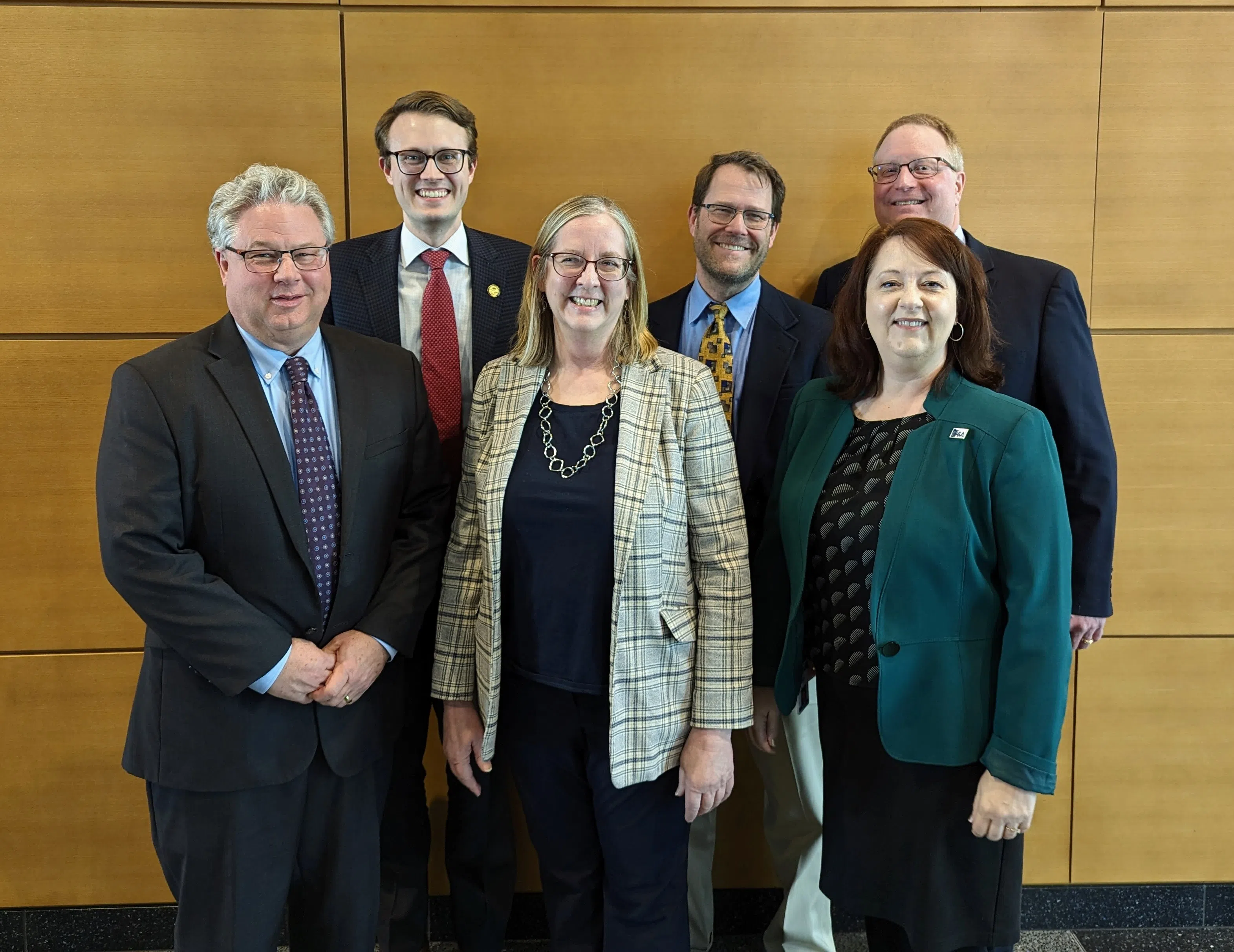
Senator Jordan Rasmusson joins stakeholders who testified in favor of his legislation, SF 1660. Front row: Bob Cedergren, chair of the Minnesota CPA Society Board of Directors; Linda Wedul, president and CEO of the Minnesota CPA Society; and Julie Blaha, state auditor. Back row: Senator Rasmusson; Eric Grube, professor of accounting at Concordia University – St. Paul; and Pat Plamann, managing partner at Schlenner Wenner & Co. based in St. Cloud. Image courtesy of Senator Rasmusson's Office.
ST. PAUL, MN — On Thursday, March 7, the Senate State and Local Government and Veterans Committee heard legislation, authored by Senator Jordan Rasmusson of Fergus Falls, to provide an alternative pathway to obtaining certified public accountant (CPA) licensure.
By bringing CPA requirements closer to previous standards, SF 1660 would remove unnecessary barriers for Minnesotans to enter this high-demand profession.
This legislation is supported by State Auditor Julie Blaha and the Minnesota Society of CPAs.
“In 2006, Minnesota’s CPA licensure requirements were increased to require an additional year of college,” Senator Rasmusson said. “Yet this change has not produced the positive benefits that were promised, and instead, has created artificial barriers for Minnesotans to become CPAs. In fact, the current extra year of college has no requirement that it be in accounting classes, meaning it could be courses on golf or fine arts. My legislation removes these barriers to help our students, accounting firms and Minnesota clients who need CPAs.”
Prior to 2006, Minnesota mandated 120 semester hours, equivalent to approximately four years of college, along with two years of work experience and successful completion of the CPA exam.
However, in 2006, the educational requirements were increased to 150 hours, roughly five years of college, and one year of work experience.
“There are multiple studies that show that the 150-hour requirement has created barriers for students, especially minority students, to becoming CPAs,” Jen Leary, CEO of Minnesota’s largest accounting firm, CLA (CliftonLarsonAllen LLP), shared in a letter of support to SF 1660. “There is no evidence that the 150-hour requirement has improved the quality of the profession. We have the power to change this. My hope as a CPA, a firm leader, and an advocate of the profession, is that we take action now to create the opportunities needed in Minnesota to welcome and foster future generations into successful careers in accounting.”
SF 1660 does not lower any standards.
An accounting major is still required with a defined accounting curriculum and the CPA exam is still a requirement.
Senator Rasmusson’s legislation only allows an alternative pathway of 120 semester hours plus two years of experience.
Additionally, the previous pathway would still be available for Minnesota accounting students who prefer to pursue it.
“The opportunity cost for a potential student–when you consider the cost of an additional year of education plus lost earnings–is about $100,000,” Senator Rasmusson said. “This can take business-minded students and push them off the CPA path and into other professions. It’s also harming Minnesotans from disadvantaged backgrounds who can’t afford the $100,000 opportunity cost to become a CPA. With our state facing a shortage of CPAs, we need to remove the barriers that are preventing Minnesotans from pursuing this in-demand career.”
During the committee hearing, opponents of this legislation expressed concerns regarding reciprocity with other states.
However, there have been states like Ohio that successfully pursued alternative pathways, and the old legacy pathway will still be in place for students with that concern.
Senator Rasmusson’s legislation also has a two-year effective date to give Minnesota time to work with the other licensing boards and states to ensure that reciprocity is not a problem.
The Senate State and Local Government and Veterans Committee unanimously approved Senator Ramusson’s bill and referred it to the Senate Finance Committee.